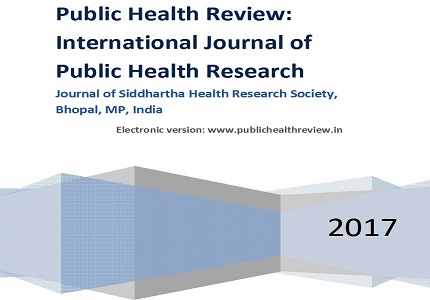Child to parent education in prevention of acute respiratory in-fections in rural school under rural health training center
Abstract
Introduction: Acute Respiratory illness in developing countries is one of the major cause of mortality and mor-bidity among under five children with more than 7 million deaths every year worldwide. Most prevalent ill-nesses of childhood include acute respiratory tract infections, malnutrition and diarrhoeal diseases in the middle and low-income countries.
Aim: Aim of the study is to find out the change in level of knowledge, attitude and practice of parents after receiving health education from their school going children.
Methods: A government aided higher secondary school from rural health training center of KIMS Karad was selected with the permis-sion of headmaster of school for the study. From the school 9th standard and their mothers were study popula-tions which were selected by applying above exclusion criteria. A pre-structured and pretested questionnaire was used to get the information regarding definition, causes, signs, symptoms, treatment, prevention respiratory infections etc. Intervention is carried to with posttest of both students and mothers.
Results: Poor and average KAP regarding Acute Respiratory Infections among children had significantly increased to Good after giving Health Education and demonstration to study group children compared to control group to whom these sessions were not conducted. Even KAP of mothers of children for whom sessions were conducted had increased significantly, from poor to good, in comparison with mothers of children for whom sessions were not conducted.
Conclusion: A appropriate and holistic health education on the causation, symptoms, signs, its prevention can help in early identification of the ante respiratory diseases and hence health seeking behavior. Hence children especially the school going children can be used as an effective tool to transmit health education among the families and communities.
Downloads
References
2. WHO: Serious childhood problem in countries with limited resources, Background book on Management of the child with serious infection or malnutrition, Geneva, 2004.
3. Bhattacharya R, Kaur P. Epidemiological correlates of diarrhoea in a rural area of Varanasi. Indian Journal of Community Medicine 1989; Vol XIV, Issue No 2:79-82. [PubMed]
4. WHO (2008), Weekly epidemiological record, 15th feb-2008; No 7. http://www.who.int/wer/2008/wer8307/en/; [Last accessed on 2017 Jul 17]
5. WHO (1999), Health situation in the South East Asia Region 1994-1997, Regional office for SEAR, New Delhi. http://apps.searo.who.int/PDS_DOCS/B3226.pdf;[Last accessed on 2017 Jul 17]
6. Mini Sheth and MonikaObrab. Diarrhoea prevention through food safety education, Indian Journal of Paediatrics 2004; Vol 71, Issue 10 :879-882.
7. Klepp KI, Halper A, Perry CL. The efficacy of peer leaders in drug abuse prevention. J Sch Health. 1986 Nov; Vol 56(9): page no 407-11. [PubMed]
8. Danielle Ferreira de Magalhães ,JoséAilton da Silva ,João Paulo Amaral Haddad , Elvio Carlos Moreira , Maria Isabel Magalhães Fonseca , Marina Lúcia Lima de Ornelas , Barbara KellenAntunes Borges , Zélia Maria Profeta da Luz. Dissemination of information on visceral leishmaniasis from school children to their families: a sustainable model for controlling the disease. jul, 2009 Cad. SaúdePública, Rio de Janeiro, 25(7):page no1642-1646.
9. M.R.Savitha, S.B.Nandeeshwara, M.J.Pradeep Kumar, Farhan-ul-haque, C.K.Raju. Modifiable risk factors for acute lower respiratory tract infections.Indianjournal of pediatrics, 2007, Volume 74, page 55-60.
10. Huda M. Haroun, Mohamed S. Mahfouz, Mohamed El Mukhtar, and Amani Salah. Assessment of the effect of health education on mothers in Al Maki area, Gezira state, to improve homecare for children under five with diarrhea. Journal of Family Community Medicine. 2010 Sep-Dec; 17(3): page141–146.
11. Lloyd, Angela, "Maternal knowledge, attitudes and practices and health outcomes of their preschool-age children in urban and rural Karnataka, India" (2009). Graduate School Theses and Dissertations. Paper 2066.
12. RameshPuri and Saroj Mehta. Impact of nutrition and health education on rural pre-school children. Indian journal of paediatrics;1994 Volume 31, page no 9-14.
13. O'Reilly CE, Freeman MC, Ravani M, Migele J, Mwaki A, Ayalo M, Ombeki S, Hoekstra RM, Quick R. The impact of a school-based safe water and hygiene programme on knowledge and practices of students and their parents: Nyanza Province, western Kenya, 2006. EpidemiolInfect. 2008 Jan;136(1):80-91. [PubMed]
14. Olajide Williams and James M. Noble; 'Hip-Hop' Stroke : A Stroke Educational Program for Elementary School Children Living in a High-Risk Community American heart and stroke association 2008;Issue no 39:Page no 2809-2816.
15. Christopher Vaughan, Julie Gack, Humberto Solorazano&Robert Ray. The Effect of Environmental Education on Schoolchildren, Their Parents, and Community Members: A Study of Intergenerational and Intercommunity Learning.
16. P. R.Walvekar, V.A.Naik, A.S.Wantamutte, M.D.Mallapur. Impact of child to child programme on know-ledge, attitude, practice regarding diarrhoea, among rural school children. Indian Journal of Community Medi-cine. April – June 2006 Volume 31,No 2,Page no 56-60.
17. A.Tragler. Health education in school children. Indian journal of Paediatrics.1991 Vol 2, Page no 541-543.
18. I.W.Fawole, M.C.Asuzu, S.O.Oduntan and W.R.Brieger. A School based AIDS education programme for secondary school students in Nigeria: a review of effectiveness. Journal of health education and research; 1999, Volume 14 no 5, page 675 - 683Christopher Vaughan, Julie Gack, Humberto Solorazano & Robert Ray. The Effect of Environmental Education on Schoolchildren, Their Parents, and Community Members: A Study of Intergenerational and Intercommunity Learning.
19. Elizabeth Blanton, Sam Ombeki , Gordon Otieno Oluoch , Alex Mwaki , Kathleen Wannemuehler , and Rob Quick. Evaluation of the Role of School Children in the Promotion of Point-of-Use Water Treatment and Handwashing in Schools and Households—Nyanza Province, Western Kenya, 2010. American Journal of Tropical Medicine and Hygiene. Volume 82(4), page no.664–671.

Copyright (c) 2017 Author (s). Published by Siddharth Health Research and Social Welfare Society

This work is licensed under a Creative Commons Attribution 4.0 International License.


 OAI - Open Archives Initiative
OAI - Open Archives Initiative


